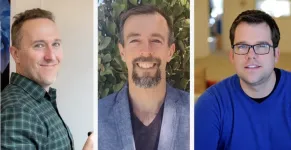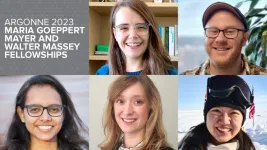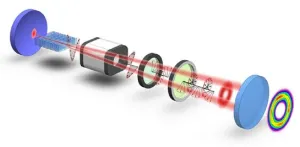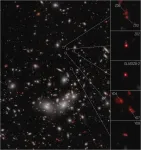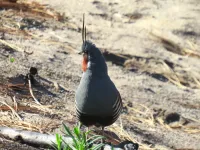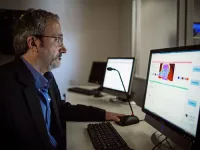(Press-News.org) Key takeaways
A study by researchers from UCLA, Australia, Ecuador, Germany, the Netherlands and the U.K. found that people around the world signal others for assistance every couple of minutes.
The research, which examined behaviors in towns and rural areas in several different countries, revealed that people comply with these small requests for help far more often than they decline them.
The findings suggest that people from all cultures have more similar cooperative behaviors than prior research has established.
A new study by UCLA sociologist Giovanni Rossi and an international team of collaborators finds that people rely on each other for help constantly.
In the study, published in Scientific Reports, the authors — who also included researchers at universities in Australia, Ecuador, Germany, the Netherlands and the U.K. — explore the human capacity for cooperation. They found that people signal a need for assistance, such as asking someone to pass them a utensil, once every couple of minutes.
And the research revealed that those requests for help do not go unanswered: Across cultures, people comply with these small requests far more often than they decline them. On the rare occasions when people do decline, they explain why.
Those human tendencies — to help others when needed and to explain when such help can’t be given — transcends cultural differences, suggesting that, deep down, people from all cultures have more similar cooperative behaviors than prior research has established.
The new findings help solve a puzzle generated by prior anthropological and economic research, which has emphasized variation in rules and norms governing cooperation.
For example, while whale hunters of Lamalera, Indonesia, follow established rules about how to share out a large catch, Hadza foragers of Tanzania share their food more out of a fear of generating negative gossip. In Kenya, wealthier Orma villagers are expected to pay for public goods such as road projects. Wealthy Gnau villagers of Papua New Guinea, on the other hand, would reject such an offer because it creates an awkward obligation to reciprocate for their poorer neighbors.
“Cultural differences like these have created a puzzle for understanding cooperation and helping among humans,” said Rossi, the paper’s first author. “Are our decisions about sharing and helping shaped by the culture we grew up with? Or are humans generous and giving by nature?”
To answer those questions, the authors analyzed over 40 hours of video recordings of everyday life involving more than 350 people in geographically, linguistically and culturally diverse sites — towns in England, Italy, Poland and Russia, and rural villages in Ecuador, Ghana, Laos and Aboriginal Australia.
The analysis focused on sequences in which one person sent a signal for help, such as asking directly or visibly struggling with a task, and another person responded. The authors identified more than 1,000 such requests, occurring on average about once every two minutes. The situations involved “low-cost” decisions about sharing items for everyday use or assisting others with tasks around the house or village, for example.
Such decisions are many orders more frequent than “high-cost” decisions such as sharing the spoils of a successful whale hunt or contributing to the construction of a village road, the types of decisions that have been found to be significantly influenced by culture.
People complied with small requests seven times more often than they declined, and six times more often than they ignored them. People did sometimes reject or ignore small requests, but a lot less frequently than they complied. The average rates of rejection (10%) and ignoring (11%) were much lower than the average rate of compliance (79%).
The preference for compliance held across all cultures and was unaffected by whether the interaction was among family or non-family members.
People helped without explanation, but when they declined, 74% of the time they gave an explicit reason. That suggests that while people decline helping only for a good reason, they give help unconditionally, without needing to explain why they are doing it.
“A cross-cultural preference for compliance with small requests is not predicted by prior research on resource-sharing and cooperation, which instead suggest that culture should cause prosocial behavior to vary in appreciable ways due to local norms, values, and adaptations to the natural, technological, and socio-economic environment,” said N. J. Enfield, the paper’s corresponding author and a linguist at the University of Sydney. “These and other factors could in principle make it easier for people to say ‘no’ to small requests, but this is not what we find.”
The findings suggest that being helpful is an ingrained reflex in the human species, Rossi said.
“While cultural variation comes into play for special occasions and high-cost exchange, when we zoom in on the micro level of social interaction, cultural difference mostly goes away, and our species’ tendency to give help when needed becomes universally visible,” he said.
END
Small acts of kindness are frequent and universal, study finds
Around the world, research reveals, people help each other about every 2 minutes
2023-04-24
ELSE PRESS RELEASES FROM THIS DATE:
Department of Energy to support 999 outstanding undergraduate students and 79 faculty members from institutions underrepresented in the scientific research enterprise
2023-04-24
WASHINGTON, DC – The Department of Energy’s (DOE’s) Office of Science will sponsor the participation of 999 undergraduate students and 79 faculty members in three STEM-focused workforce development programs at 16 DOE national laboratories and a national fusion facility during summer 2023. Collectively, these programs ensure DOE and our nation have a strong, sustained workforce trained in the skills needed to address the energy, environment, and national security challenges of today and tomorrow.
“Our future depends on the next generation ...
Metabolism: not the limiting factor in prokaryotic endosymbiosis
2023-04-24
“One of the great mysteries of biology,” says Eric Libby, former SFI Postdoctoral Fellow, now an associate professor at the Integrated Science Lab (IceLab), Umeå University in Sweden, “is eukaryogenesis, or how eukaryotes arose.” Scientists consider this to be a period of major evolutionary transition, critical to our understanding of the history and evolution of life on Earth.
In a new study published on April 21, 2023, in PNAS, Libby worked with SFI Professor Christopher Kempes and Jordan ...
Argonne names newest Maria Goeppert Mayer and Walter Massey Fellows
2023-04-24
The U.S. Department of Energy’s (DOE) Argonne National Laboratory has awarded its newest cohort of named fellowships, providing five early-career scientists with additional support as they pursue pivotal discoveries that will make Americans safer and better off and increase our understanding of the universe.
For 2023, the laboratory has named four Maria Goeppert Mayer Fellows and one Walter Massey Fellow. Maria Goeppert Mayer was a pioneering nuclear physicist who received the 1963 Nobel Prize in physics for discovering, at Argonne, the shell model of the atomic nucleus. Walter Massey ...
Generation of color-tunable high-performance LG laser beams via Janus OPO
2023-04-24
Laguerre-Gaussian (LG) modes are a type of light wave that can carry the external torque of photons as they move through space. They are useful in many fields, from optical communications to super-resolution imaging. Advanced developments in these and other applications demand reliable and color-tunable LG mode laser sources, which do not yet exist.
An optical parametric oscillator (OPO) is a device that can generate a wavelength-tunable laser beam, so it has been used to realize a color-tunable LG laser source — generally, in one of two ways. One way is to change a regular beam into an LG beam using a phase component ...
Webb reveals early-universe prequel to huge galaxy cluster
2023-04-24
Every giant was once a baby, though you may never have seen them at that stage of their development. NASA’s James Webb Space Telescope has begun to shed light on formative years in the history of the universe that have thus far been beyond reach: the formation and assembly of galaxies. For the first time, a protocluster of seven galaxies has been confirmed at a distance that astronomers refer to as redshift 7.9, or a mere 650 million years after the big bang. Based on the data collected, astronomers calculated the nascent cluster’s future development, finding that it will likely grow in size and mass to resemble the Coma Cluster, ...
Study: Mountain quail may benefit from high severity wildfire
2023-04-24
Ithaca, NY--Mountain Quail are an under-studied but recreationally-valued management indicator species in California's Sierra Nevada. They are notoriously difficult to study due to their penchant for impenetrable, dense, shrubby habitats, high elevations, and steep slopes. In this study, researchers used 1,636 autonomous recording units across about 22,000 square kilometers to conduct the first ever systematic and comprehensive study of Mountain Quail habitat associations and fire ecology in the Sierra Nevada.
Researchers from the Cornell Lab of Ornithology, the University of Minnesota, Univesity of Wisconsin-Madison, and the ...
Keeping a tighter rein on blood pressure in adults over 50 is desirable for brain health
2023-04-24
SAN ANTONIO (April 24, 2023) — Intensive blood pressure treatment significantly reduces the risk of adverse cerebrovascular events such as stroke. New research from The University of Texas Health Science Center at San Antonio (UT Health San Antonio) shows evidence of how the brain benefits from consistently lower blood pressure.
The study, published March 1 in JAMA Network Open, is a follow-up analysis of the Systolic Blood Pressure Intervention Trial (SPRINT), a multicenter clinical trial that compared intensive systolic blood pressure control ...
Fear not the deadlines, new research finds
2023-04-24
Deadlines are part and parcel of modern knowledge work. Journalists must serve their weekly columns, managers must turn in their monthly reports, and researchers must submit their papers and proposals on time. Despite their ubiquity, deadlines conjure up negative feelings and are perceived as challenging events. Accordingly, there has been a trend to do away with deadlines, where possible. For instance, the National Science Foundation (NSF) in the United States introduced no-deadline submissions in some of its funding programs. Critics, however, have been arguing that although deadlines may be painful, they are necessary, because they motivate people to act.
Researchers from the University ...
Winter cover crops could reduce nitrogen in Illinois drainage water by 30%
2023-04-24
URBANA, Ill. – As Corn Belt states seek ways to curb nitrogen flow from farms into the Gulf of Mexico, new University of Illinois research adds evidence for winter cover crops as an important part of the solution. A simulation study published in Science of the Total Environment finds widespread planting of cereal rye in Illinois could reduce nitrate in the state’s tile drainage water by 30%.
The research team, part of the College of Agricultural, Consumer and Environmental Sciences (ACES) and The Grainger ...
Mount Sinai launches Institute for Regenerative Medicine
2023-04-24
Regenerative medicine—the process of replacing, engineering or regenerating human cells, tissues or organs—holds exciting potential for the field of health care. It could someday make it possible to grow a new kidney in a petri dish, repair damaged nerve cells, or reverse memory loss.
Continuing a commitment to advance medicine through forward-thinking approaches and groundbreaking discoveries, the Icahn School of Medicine at Mount Sinai is announcing the creation of the Institute for Regenerative Medicine to foster innovative research into new pathways to cure ...
LAST 30 PRESS RELEASES:
The long standing commercialization challenge of lithium batteries, often called the dream battery, has been solved.
New method to remove toxic PFAS chemicals from water
The nanozymes hypothesis of the origin of life (on Earth) proposed
Microalgae-derived biochar enables fast, low-cost detection of hydrogen peroxide
Researchers highlight promise of biochar composites for sustainable 3D printing
Machine learning helps design low-cost biochar to fight phosphorus pollution in lakes
Urine tests confirm alcohol consumption in wild African chimpanzees
Barshop Institute to receive up to $38 million from ARPA-H, anchoring UT San Antonio as a national leader in aging and healthy longevity science
Anion-cation synergistic additives solve the "performance triangle" problem in zinc-iodine batteries
Ancient diets reveal surprising survival strategies in prehistoric Poland
Pre-pregnancy parental overweight/obesity linked to next generation’s heightened fatty liver disease risk
Obstructive sleep apnoea may cost UK + US economies billions in lost productivity
Guidelines set new playbook for pediatric clinical trial reporting
Adolescent cannabis use may follow the same pattern as alcohol use
Lifespan-extending treatments increase variation in age at time of death
From ancient myths to ‘Indo-manga’: Artists in the Global South are reframing the comic
Putting some ‘muscle’ into material design
House fires release harmful compounds into the air
Novel structural insights into Phytophthora effectors challenge long-held assumptions in plant pathology
Q&A: Researchers discuss potential solutions for the feedback loop affecting scientific publishing
A new ecological model highlights how fluctuating environments push microbes to work together
Chapman University researcher warns of structural risks at Grand Renaissance Dam putting property and lives in danger
Courtship is complicated, even in fruit flies
Columbia announces ARPA-H contract to advance science of healthy aging
New NYUAD study reveals hidden stress facing coral reef fish in the Arabian Gulf
36 months later: Distance learning in the wake of COVID-19
Blaming beavers for flood damage is bad policy and bad science, Concordia research shows
The new ‘forever’ contaminant? SFU study raises alarm on marine fiberglass pollution
Shorter early-life telomere length as a predictor of survival
Why do female caribou have antlers?
[Press-News.org] Small acts of kindness are frequent and universal, study findsAround the world, research reveals, people help each other about every 2 minutes
